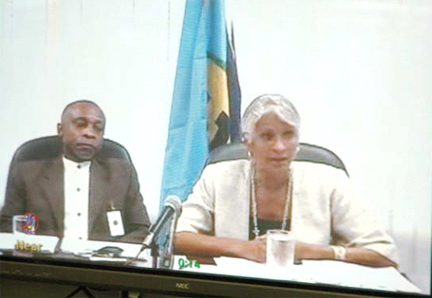The first round of talks between negotiators from Caricom and Canada on trade relationships saw the regional team emphasising the need for a development-oriented agreement to benefit the region, Ambassador Gail Mathurin said yesterday.

Mathurin, who is the Head of the Office of Trade Negotiation (OTN), told Guyanese and Barbadian reporters that during the discussions, Canada indicated its recognition of the need for symmetry as it related to the trade agreement and signalled its willingness to recognise various levels of development in the Caricom territories.
She made these disclosures during a press conference where members of the Caricom Secretariat and local reporters participated via video conference.
According to her, during the discussions which took place in Barbados last week representatives from the OTN “placed great emphasis” on the part of Caricom’s mandate, which calls for a development-oriented agreement. According to her, this development is seen in two main ways. She said in the first instance, the region is seeking a distinct chapter on development co-operation. Secondly, she noted that “in each subject area, we are putting forward specific development oriented proposals which the region hopes will become articles in the various facets of the agreement.”
Mathurin noted that issues such as market access, as it relates to agriculture and industrial goods, services, culture and investment as well as institutional issues and dispute settlement were all discussed.
According to her, the Canadian negotiators were interested in Caricom’s current position in working with suppliers throughout the region, to bring them together to develop standards, as well as the systems which will be used to help service providers. The Canadian negotiators also wanted to know what Caricom is planning to do with regard to the regional regulating system for financial services and also asked for information on the Common External Tariff (CET) and how it operates. She also said that the negotiators required information on rum, since this product is of much interest in these negotiations.
Meanwhile, Mathurin expressed concern about the slow pace of the Doha negotiations which she said was hindering progress in the region.
She also underscored the importance of the involvement of the private sector and non-state actors in preparations for external trade negotiations. She further stated that the OTN had in train outreach programmes to augment these sectors’ involvement in the regions’ trade and development agenda.
Additionally, Mathurin said her office was working closely with the Implementa-tion Unit of the Economic Partnership Agreement (EPA), to ensure that arrangements were in place for the execution of the EPA, which Caricom signed with the European Community (EC) in October 2008.
The OTN body was established after the 30th Caricom Conference of Heads of Government where it was decided that the Caribbean Regional Negotiating Machi-nery (CRNM) would be renamed the Office of Trade Negotiations (OTN). Caricom Secretary General Edwin Carrington told reporters yesterday that the OTN now has responsibility for the coordination, development and execution of negotiation strategies for all the external trade negotiations of the community. He explained that previously the Secretariat negotiated some of these external trade negotiations.
“Two-way merchandise trade between Caricom and Canada averaged more than US$700 million over the last ten years with a surplus averaging more than US$60 million in favour of the region,” the secretariat stated in a release.
According to the Secretariat, “current trade and economic co-operation relations between Caricom and Canada are covered under a number of instruments.” These include “the 1979 Caricom-Canada Trade and Economic Co-operation Agreement and its Protocols, including the 1998 Protocol on Rum; CARIBCAN which grants unilateral duty free access to eligible goods from beneficiary countries in the English-speaking Caribbean up to 2011.”
